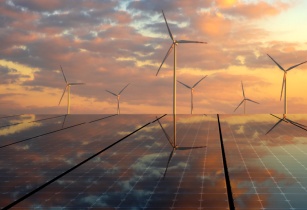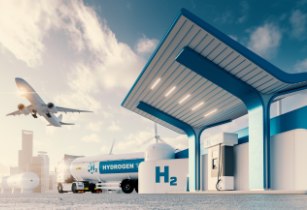
Javier Cavada, president and CEO at Mitsubishi Power underscores MENA’s potential to leapfrog developed nations in hydrogen production, at COP 27’s Climate Action Hydrogen Transition Summit. (Image source: Mitsubishi Power)
Mitsubishi Power, a power solutions brand of Mitsubishi Heavy Industries, Ltd. (MHI), participated in COP27, which took place in Sharm El-Sheikh, Egypt, where it showcased its pioneering technology advances in decarbonisation and their application to accelerate the energy transition
A global leader in low carbon engineering and technology, the company brings decades of experience and expertise that can play a vital role in the development of sustainable, resilient and carbon-neutral energy systems.
At COP27’s Hydrogen Transition Summit, one of Climate Action’s key events this year, Mitsubishi Power underscored the opportunity of hydrogen as a main enabler of energy transition, and as an integral constituent of a future decarbonised energy system.
In the opening session of the Summit, Javier Cavada, president and CEO of Europe, Middle East and Africa at Mitsubishi Power, highlighted the key role the MENA region can play in this regard: “The MENA region’s potential to become a major exporter of hydrogen, with the availability of abundant and low-cost renewables, existing export infrastructure, as well as financing resources.”
Dr Cavada also stressed the importance of collaboration to realise the potential of hydrogen. “While hydrogen will continue to play an essential role in decarbonisation, its widespread deployment will require unprecedented collaboration with both existing and new technologies, industry partners, policymakers, and NGOs.”
Demonstrating the brand’s commitment to realising a carbon neutral society, MHI is committed to achieve carbon neutrality across its operations by 2040. MHI is also adopting a new goal to achieve Net Zero emissions through its entire value chain by 2040. In line with this ambition, Mitsubishi Power continues to develop energy solutions and processes that enable hydrogen’s transition from industrial use to being the clean fuel of choice.
“Since 1970, Mitsubishi Power has pioneered hydrogen fuel combustion technologies. With our recent projects that have demonstrated the large-scale commercial validation of our technology and decades-long expertise in this field, we are committed to support our customers across the region accelerate their energy transition with affordable and reliable solutions. This is going to be essential to demonstrating how hydrogen can competitively fulfil clean energy expectations and bring us one step closer towards a carbon neutral society,” added Cavada.
One recent example is the full turnkey contract Mitsubishi Power signed with leading Egyptian oil & gas company, Alexandria National Refining & Petrochemicals Company (ANRPC), to provide advanced hydrogen fuel conversion technology solutions, supporting the company to achieve its decarbonisation goals. The solution will be installed at the ARNPC refinery plant in Alexandria, which provides 30% of Egypt’s gasoline supply for domestic consumption.
Dr Emmanouil Kakaras, executive vice-president Next Energy Business at MHI EMEA, also participated in Climate Action’s Sustainable Innovation Forum, where he joined a panel of experts to discuss advanced energy solutions that can cut emissions rapidly enough to stay on track for a net-zero 2050 goal.
“Decarbonisation will be achieved by focusing on increasing energy efficiency and collaborating closely to develop and scale up hydrogen and CO2 value chains. There is no one-size-fits-all approach to net-zero 2050 — different regions and sectors will choose different pathways. As emissions cannot be avoided altogether and disruption to existing economies needs to be kept at a minimum, particularly as we’re faced with the “energy trilemma” of sustainability, solutions such as hydrogen will play a central role in many of these approaches,” Dr Kakaras said.







